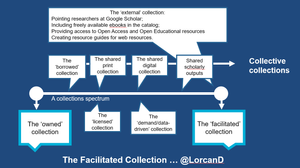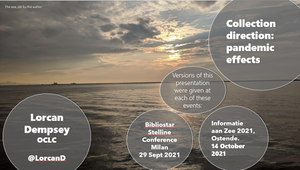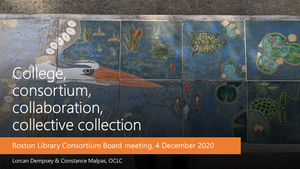Readers will have noted recently that I have been interested in reputation management and impact, and in how libraries may support institutional goals in these areas. In this context I was interested to read the following in a thoughtful reflection on future directions for research libraries by Susan Gibbons:
Another shift in technical service in academic libraries will be towards the facilitation of discovery and access of locally created materials. The rising importance of open access and the growing acceptance of download counts as part of an academic’s impact metric will cause higher education institutions to focus on achieving the widest possible distribution of their locally created content. Dissertations, articles, books, working papers, technical reports, and other such content will flood into the campus libraries for curation, description, and distribution. Technical service staff will find an increasing percentage of their work shifted away from the procurement of external content to the care and distribution of locally created content.
Another emerging need for the expertise of technical services staff in academic libraries will develop from the expanding importance of the gathering and maintenance of institutional metrics. The need for a higher education institution to demonstrate its impact on society and return on investment to its state, federal, foundation, and alumni donors will drive the coordination and consolidation of institutional data, such as publications, citations, and grant outputs. The library is a natural locus for such operations, in part as a service related to the institutional repository. [Time horizon 2020: Library renaissance PDF]
I was also interested in Susan’s emphasis on new forms of collaborative sourcing.
Ironically, I think the Google Book Settlement will cause a resurgence in the use of the current print collections of libraries as users discover content that was hidden by the difference between searching a full-text index and a MARC record. As these books are rediscovered, there will be a shifting of resources in technical services towards the identification, preservation, and some level of republication of books held uniquely by each library. Regional collaborations around the identification and preservation of last copies, shared off-site storage, and cooperative collection development will open doors towards more formalized sharing of regional skills, infrastructure, and resources. I believe academic libraries will model partnerships which their academic institutions will later need to follow as higher education as a whole retrenches through economic and demographic necessity. [Time horizon 2020: Library renaissance PDF]
This has also been a topic of interest in these pages. As libraries begin to think about their collective collection and its collaborative management in more focused ways, the balance between local provision , shared provision in offsite storage, and digital availability in GBS or Hathi Trust will become a major focus of service and policy attention.



